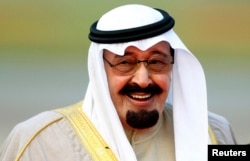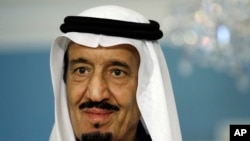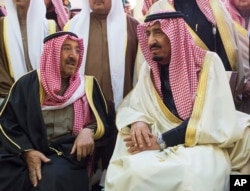World leaders are descending on Saudi Arabia to pay respects following the death of King Abdullah.
Despite deep tensions between the nations, Iranian Foreign Minister Mohammad Javad Zarif was one of the first to arrive Saturday.
President Barack Obama is cutting short a visit to India to fly to the Sunni-ruled kingdom on Tuesday. He called the new Saudi king, Salman bin Abdul-Aziz, from Air Force One en route to India on Saturday to express his sympathies. The White House said Salman welcomed the news that Obama was coming to Riyadh.
Vice President Joe Biden was to have led a delegation on the president's behalf, but he will now remain in Washington.
Others arriving to meet the new king included Britain's Prince Charles and Prime Minister David Cameron, French President Francois Hollande and Egyptian President Abdel Fattah el-Sissi. A Saudi Arabian delegation was shown on video Saturday greeting the presidents of Afghanistan and Tunisia and the vice presidents of India and Indonesia.
The 90-year-old king, one of the world's few absolute monarchs, died Friday after being hospitalized with pneumonia. Abdullah was buried in a simple white shroud, according to Muslim tradition, in an unmarked grave at Al Oud public cemetery, following a simple ceremony in Riyadh attended by the Arab and Muslim world's top leaders, including Turkish President Recep Tayyip Erdogan.
Meanwhile, the oil-rich kingdom moved quickly to ensure a smooth transition by appointing a new monarch. Salman, Abdullah's half brother, pledged to continue Abdullah's policies.
The new king, thought to be 79, has been crown prince and defense minister since 2012. Another half brother, Muqrin, was named the new crown prince.
Salman named his nephew, Mohammed bin Nayef, as the new deputy crown prince and his son, Mohammed bin Salman, as Saudi Arabia's new defense minister and head of the royal court. Salman also said he would keep most other ministers.
In a televised speech, Salman vowed to "continue adhering to the correct policies" of his predecessors. "We will remain, God willing, holding the straight course that this country has walked on since its establishment by the late King Abdul-Aziz," he said.
The new king led prayers at the funeral service for Abdullah at the Imam Turki Bin Abdullah Grand Mosque in Riyadh.
On Friday evening, hundreds of Saudis visited a royal palace in Riyadh to wish their new leader well.
At his passing, Abdullah drew both lavish praise and sharp criticism.
From the Middle East to the West, praise centered on the late king's promotion of peace.
Lebanese Prime Minister Tammam Salam issued a statement saying Lebanon has lost "a defender and partner" who stood by Beirut in difficult times.
U.N. Secretary-General Ban Ki-moon lauded the king's "generous humanitarian and developmental support for people across the Arab region and wider world," saying he "left a tangible legacy that can still point the way toward peace in the Middle East."
Israeli President Reuven Rivlin hailed Abdullah as an exemplary leader, while Palestinian President Mahmoud Abbas described his death as "a loss to the Arab and Islamic world."
Abbas and several other regional leaders declared official mourning periods for the late king, including a week in Egypt and 40 days in Jordan.
Other reactions to Abdullah's passing were less complimentary.
Human Rights Watch said in a statement that Abdullah’s reign "brought about marginal advances for women but failed to secure the fundamental rights of Saudi citizens to free expression, association and assembly."
The rights group urged his successor, Salman, to "halt persecution of peaceful dissidents and religious minorities, end pervasive discrimination against women, and ensure greater protections for migrant workers."
Meanwhile, Islamic militants and their supporters celebrated the king's passing.
"He sent his warplanes to kill Muslims in [Syria]. He imprisoned Muslim men and women and wherever there was a war against jihadis, he was the first," a jihadi supporter named Abu Azzam al-Najdi railed on social media, Reuters reported.
Twitter posters used hashtags that, translated from Arabic, mean "Death of a Tyrant," the news agency said.
Watch related video by VOA's Jeff Custer
Abdullah ushered in modern era
Abdullah officially ascended to the throne in 2005. But he actually had ruled since 1995, when his predecessor and half brother, King Fahd, suffered an incapacitating stroke.
Abdullah is believed to have been born in Riyadh in 1924 to an ultra-conservative family in which the traditions and hospitality of Islam were always stressed.
As he grew into adulthood, oil was discovered in the Saudi desert and the country grew into the world's top oil exporter, bringing vast wealth to royal family.
Upon taking control, Abdullah began unprecedented moves to modernize the conservative kingdom.
Women were given a voice in politics. This year, for the first time, they'll be allowed to vote in local elections.
Abdullah also established a Western-style university where students from both sexes openly mixed and shared classes.
Previously banned music could be heard on Saudi television and radio.
Foreign policy maverick
Abdullah was something of a maverick in his foreign policy. He proposed a peace deal in which Arab League states would recognize Israel if the Palestinians got their own state.
In a leaked U.S. diplomatic note, the king urged the U.S. military to attack Iran and "cut off the head of the snake" to stop it from building a nuclear weapon.
Saudi Arabia is one of the top suppliers of arms to the rebels fighting to overthrow the Syrian government. It is a leading member of the U.S.-led coalition fighting against Islamic State in Iraq and Syria.
Saudi Arabia is part of the G20 economic bloc and the World Trade Organization.
Despite reforms at home and moderation abroad, human rights groups continue to assail Saudi Arabia. They say women are still denied many basic rights.
The king refused to support the Arab Spring movements that toppled dictatorships in Tunisia, Egypt, Libya and Yemen.
Dissent is not tolerated, free speech is muffled, and criminals still face extreme punishment such as beheadings.
Some information for this report was contributed by Reuters.










